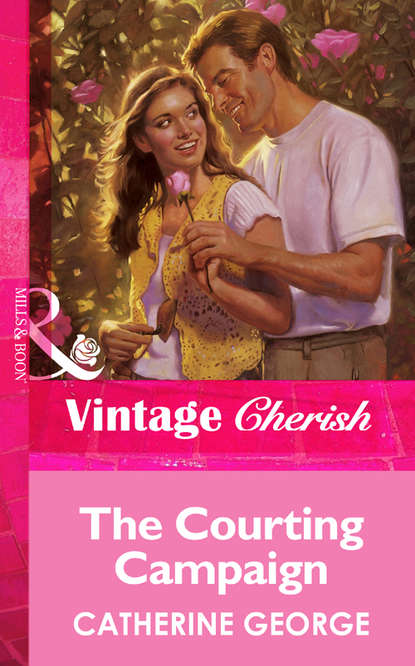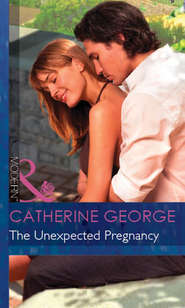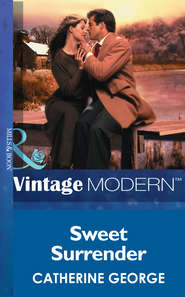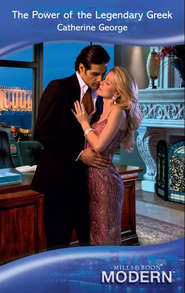По всем вопросам обращайтесь на: info@litportal.ru
(©) 2003-2024.
✖
The Courting Campaign
Автор
Год написания книги
2018
Настройки чтения
Размер шрифта
Высота строк
Поля
The Courting Campaign
CATHERINE GEORGE
The thrill of the chase!Patrick Hazard had a plan of action that took Hester by surprise. She hadn't intended falling in love with anyone, but Patrick wasn't content just to be friends–he wined and dined Hester, pursued her and wooed her…whatever it took to win her over.Secretly, Hester didn't need moonlight and roses to tell her that she and Patrick shared something special. As far as she was concerned, she was now spoken for–or had she spoken too soon? What was preventing Patrick from making that final proposal of marriage?Of A Brief Encounter:"Catherine George brings readers a delightful tale of falling in love."–Romantic Times
“This is an outrageously romantic place, Patrick.” (#uf535342d-4e91-5c97-a098-4da0d85c7485)About the Author (#u467d5884-2502-526b-a035-b9f3d250ac79)Title Page (#u3006ccb1-58b0-59c8-9ee2-8cb8dcc00611)CHAPTER ONE (#ue5473142-382d-576d-917c-9d21af78e9cb)CHAPTER TWO (#ubce8a045-dff1-5119-83e4-b46ddd6820f7)CHAPTER THREE (#u8a0083e8-b08a-5699-81cb-7e437b1fd714)CHAPTER FOUR (#litres_trial_promo)CHAPTER FIVE (#litres_trial_promo)CHAPTER SIX (#litres_trial_promo)CHAPTER SEVEN (#litres_trial_promo)CHAPTER EIGHT (#litres_trial_promo)CHAPTER NINE (#litres_trial_promo)CHAPTER TEN (#litres_trial_promo)CHAPTER ELEVEN (#litres_trial_promo)Copyright (#litres_trial_promo)
“This is an outrageously romantic place, Patrick.”
“I know,” he said smugly. “Why do you think I brought you here?”
She looked at him and laughed. “A softening-up process?”
“Yes,” he said shamelessly. “I’m doing all I can to establish myself in your good books. And,” he added, his voice deepening, “I’m somehow managing to keep at arm’s length when you know perfectly well my instincts urge me otherwise. In the interests of truth I’m warning you—it’s all a plan of campaign.”
“Campaigns usually mean battles,” she said thoughtfully. “What, exactly, do you intend to gain?”
“Victory,” he said promptly, and took her in his arms and kissed her.
Catherine George was born in Wales, and early on developed a passion for reading, which eventually fueled her compulsion to write. Marriage to an engineer led to nine years in Brazil, but on his later travels the education of her son and daughter kept her in the U.K. And instead of constant reading to pass her lonely evenings she began to write the first of her romances. When not writing and reading she loves to cook, listen to opera, browse in antique shops and walk her dog.
The Courting Campaign
Catherine George
www.millsandboon.co.uk (http://www.millsandboon.co.uk)
CHAPTER ONE
IT WAS the slight bow to the bench which caught Hester’s attention. The man was a stranger—tallish, slim, wearing the kind of baggy tweed jacket which could have been Armani or Oxfam. Probably the former, she thought, glad that the next case was the last of the session. The courtroom was hot. June sunshine blazed down from high windows onto a newly refurbished decor of cream-painted walls, crimson tip-up seats and flowered curtains—very different from the old, beautiful oak-panelling of pre-refit days. Now the entire courthouse was light and bright, but lacked its former gravitas. There was nothing here to intimidate the offenders brought up before the magistrates, most of whom, like Hester Conway, felt nostalgia for the courtroom in all its previous Victorian splendour.
So far the morning had provided the usual quota of summary offences involving traffic, excess alcohol and breaches of the peace, and the sentences had been straightforward. Hester was a relatively new magistrate, and at thirty-four the youngest in the district. In consequence she tended to dress down for her days in court. Despite the heat of the day her suit was unrelieved navy, and her dark hair was caught back in a severe twist with no escaping wisps. A large pair of horn-rimmed spectacles provided the finishing touch for the role she took very seriously. On her mettle to prove she possessed the intelligence, common sense, integrity and fair play required of her as a lay magistrate, she had, as usual, paid meticulous attention to every shred of evidence presented during the morning by both prosecution and defence. Today the three magistrates consisted of herself, Dr Tom Meadows—senior partner of the local medical practice—and Mr Philip Galbraith—retired headmaster of the local boys’ school, and President of the Bench.
Before the break most of the defendants had pleaded guilty and accepted whatever penalties, compensation and fines had been handed out. But the defendant about to be tried was pleading not guilty, which meant a lengthier, contested session to round off the morning.
Hester noted a reporter from the local paper, plus a sprinkling of spectators in the seats provided, including the man in the tweed jacket, who stood out from the rest. She registered thick fair hair, a deep-dyed suntan, and a clear-cut cast of feature which combined good looks with intelligence. Attractive, she thought, returning to her notes.
‘Who’s the fair man at the back?’ muttered Philip Galbraith, who always assumed Hester knew everyone in the entire neighbourhood.
‘No idea,’ she returned in an undertone. ‘Ask Dr Meadows.’
But the doctor was no wiser.
‘Dominic Anthony Barclay,’ announced the usher, and a tall youth entered the court and took a seat in the last of the three rows in the body of the court.
‘Stand up, Mr Barclay,’ said the President without emphasis, and the boy shot to his feet.
Hester eyed him with interest. During the morning all the defendants, male and female, had been dressed with a certain uniformity. Gaudy sweatshirts, jeans, sneakers and multiple earrings on both male and female had been the order of the day. Dominic Anthony Barclay, however, was in grey flannel trousers, crisp white shirt, striped tie and navy blazer. His fair hair—instead of hanging down his back, cropped cruelly short or shaved off entirely—was expertly cut, allowing one shining lock to flop slightly over his forehead.
He gave his name and address in educated, accentless tones, and despite obvious nerves firmly stated his plea of not guilty to the offence of driving while disqualified.
When asked what had happened on the night in question he informed the bench that his brother had been driving his car.
He was allowed to sit down while the prosecution informed the bench that the defendant had been recognised at the wheel of a car by a policewoman on the night of March twenty-fourth in Ashdown Lane, six months after having been disqualified from driving for two years. The witness for the prosecution was WPC Jean Harding, the policewoman in question.
WPC Harding, a bright-eyed young woman in her mid-twenties, made a good impression in the witness box. She repeated her oath as firmly as the defendant, but with an attractive hint of local burr in her voice.
In response to the prosecution’s enquiry she confirmed that she had been driving down Ashdown Lane on the night in question, just as it had been growing dark. There had been parked cars on both sides of the narrow road, and she had pulled in to a kerbside space to allow a current model Ford Escort to pass. She had recognised Dominic Barclay at the wheel. There had been another passenger in the defendant’s vehicle, but in the few seconds necessary for the car to travel past she’d been certain only of the identity of the driver.
The young policewoman gave her evidence calmly, consulting her notebook where necessary, and Hester scribbled a few notes of her own on her pad. The prosecution went on to ask the policewoman how she knew the defendant, and learned that WPC Harding had been the officer who had attended Ashdown House two weeks earlier to request the defendant to turn down the volume of music at a party given there to celebrate his birthday.
‘And on that occasion were you close enough to Mr Barclay to see his features clearly?’
‘Yes,’ continued the policewoman woodenly. ‘He kissed me on both cheeks and invited me to join the party. When I declined he reduced the volume as requested, whereupon my colleague and I left the premises.’
The prosecution sat down, and the defending solicitor rose to his feet to ask if, on the night of the party, Mr Barclay’s behaviour had been offensive.
‘No,’ said the policewoman.
‘But he did kiss you and invite you to the party. Was there a reason for this?’ asked the defendant’s solicitor gently.
The girl coloured. ‘He thought I was a strippergram,’ she said, after a pause, and the solicitor smiled indulgently as a ripple of amusement ran through the court.
‘Did this annoy you, Constable?’
‘No, sir.’
‘The incident did not prejudice you in any way when you believed you saw the defendant at the wheel of the Escort?’
The girl’s mouth tightened. ‘No, sir.’
‘And during your visit to Ashdown House did you have occasion to meet Dominic Barclay’s brother?’
‘No, sir.’
‘Thank you, Constable.’
Hester made more notes as the witness was excused. Young Dominic’s guilt seemed cut and dried. Then a hush fell over the court as the usher showed a young man to the witness box.
Giles Edward Barclay gave his name and address, took the oath and stated that he was the brother of the defendant. The statement was unnecessary. Right down to the last shining hair he was a mirror image of Dominic. The Barclay brothers were identical twins.
In unemphatic tones the boy informed the bench that he had been driving the car on the night in question, due to his brother’s disqualification.
Hester watched him closely as he gave his evidence. He looked nervous, in common with most youths of his age in these circumstances, but he answered the questions steadily enough, confirmed that he possessed a current driving licence and made a very good impression. Hester glanced at the man in the visitors’ seats. He was sitting perfectly still, his eyes on the boy in the witness stand, no vestige of expression on his face. Yet Hester was sure that behind the imperturbable exterior the man was tense. He looked extraordinarily young to possess teenage sons, but the resemblance was unmistakable. He was obviously their father.
She returned her attention to the proceedings. After only the shortest of consultations between the three magistrates the case was dismissed, and Dominic Barclay was told he was free to go—after a pointed reminder from the President that the term of disqualification from driving still had fifteen months to run.
‘There was no way that we could prove that he, or his brother, was lying,’ said Philip Galbraith later as they finished for the day. ‘But I’ve had years of experience with boys like Dominic Barclay, not to mention the pranks played by identical twins.’
‘You think the other boy lied?’ asked Hester, collecting her belongings.
CATHERINE GEORGE
The thrill of the chase!Patrick Hazard had a plan of action that took Hester by surprise. She hadn't intended falling in love with anyone, but Patrick wasn't content just to be friends–he wined and dined Hester, pursued her and wooed her…whatever it took to win her over.Secretly, Hester didn't need moonlight and roses to tell her that she and Patrick shared something special. As far as she was concerned, she was now spoken for–or had she spoken too soon? What was preventing Patrick from making that final proposal of marriage?Of A Brief Encounter:"Catherine George brings readers a delightful tale of falling in love."–Romantic Times
“This is an outrageously romantic place, Patrick.” (#uf535342d-4e91-5c97-a098-4da0d85c7485)About the Author (#u467d5884-2502-526b-a035-b9f3d250ac79)Title Page (#u3006ccb1-58b0-59c8-9ee2-8cb8dcc00611)CHAPTER ONE (#ue5473142-382d-576d-917c-9d21af78e9cb)CHAPTER TWO (#ubce8a045-dff1-5119-83e4-b46ddd6820f7)CHAPTER THREE (#u8a0083e8-b08a-5699-81cb-7e437b1fd714)CHAPTER FOUR (#litres_trial_promo)CHAPTER FIVE (#litres_trial_promo)CHAPTER SIX (#litres_trial_promo)CHAPTER SEVEN (#litres_trial_promo)CHAPTER EIGHT (#litres_trial_promo)CHAPTER NINE (#litres_trial_promo)CHAPTER TEN (#litres_trial_promo)CHAPTER ELEVEN (#litres_trial_promo)Copyright (#litres_trial_promo)
“This is an outrageously romantic place, Patrick.”
“I know,” he said smugly. “Why do you think I brought you here?”
She looked at him and laughed. “A softening-up process?”
“Yes,” he said shamelessly. “I’m doing all I can to establish myself in your good books. And,” he added, his voice deepening, “I’m somehow managing to keep at arm’s length when you know perfectly well my instincts urge me otherwise. In the interests of truth I’m warning you—it’s all a plan of campaign.”
“Campaigns usually mean battles,” she said thoughtfully. “What, exactly, do you intend to gain?”
“Victory,” he said promptly, and took her in his arms and kissed her.
Catherine George was born in Wales, and early on developed a passion for reading, which eventually fueled her compulsion to write. Marriage to an engineer led to nine years in Brazil, but on his later travels the education of her son and daughter kept her in the U.K. And instead of constant reading to pass her lonely evenings she began to write the first of her romances. When not writing and reading she loves to cook, listen to opera, browse in antique shops and walk her dog.
The Courting Campaign
Catherine George
www.millsandboon.co.uk (http://www.millsandboon.co.uk)
CHAPTER ONE
IT WAS the slight bow to the bench which caught Hester’s attention. The man was a stranger—tallish, slim, wearing the kind of baggy tweed jacket which could have been Armani or Oxfam. Probably the former, she thought, glad that the next case was the last of the session. The courtroom was hot. June sunshine blazed down from high windows onto a newly refurbished decor of cream-painted walls, crimson tip-up seats and flowered curtains—very different from the old, beautiful oak-panelling of pre-refit days. Now the entire courthouse was light and bright, but lacked its former gravitas. There was nothing here to intimidate the offenders brought up before the magistrates, most of whom, like Hester Conway, felt nostalgia for the courtroom in all its previous Victorian splendour.
So far the morning had provided the usual quota of summary offences involving traffic, excess alcohol and breaches of the peace, and the sentences had been straightforward. Hester was a relatively new magistrate, and at thirty-four the youngest in the district. In consequence she tended to dress down for her days in court. Despite the heat of the day her suit was unrelieved navy, and her dark hair was caught back in a severe twist with no escaping wisps. A large pair of horn-rimmed spectacles provided the finishing touch for the role she took very seriously. On her mettle to prove she possessed the intelligence, common sense, integrity and fair play required of her as a lay magistrate, she had, as usual, paid meticulous attention to every shred of evidence presented during the morning by both prosecution and defence. Today the three magistrates consisted of herself, Dr Tom Meadows—senior partner of the local medical practice—and Mr Philip Galbraith—retired headmaster of the local boys’ school, and President of the Bench.
Before the break most of the defendants had pleaded guilty and accepted whatever penalties, compensation and fines had been handed out. But the defendant about to be tried was pleading not guilty, which meant a lengthier, contested session to round off the morning.
Hester noted a reporter from the local paper, plus a sprinkling of spectators in the seats provided, including the man in the tweed jacket, who stood out from the rest. She registered thick fair hair, a deep-dyed suntan, and a clear-cut cast of feature which combined good looks with intelligence. Attractive, she thought, returning to her notes.
‘Who’s the fair man at the back?’ muttered Philip Galbraith, who always assumed Hester knew everyone in the entire neighbourhood.
‘No idea,’ she returned in an undertone. ‘Ask Dr Meadows.’
But the doctor was no wiser.
‘Dominic Anthony Barclay,’ announced the usher, and a tall youth entered the court and took a seat in the last of the three rows in the body of the court.
‘Stand up, Mr Barclay,’ said the President without emphasis, and the boy shot to his feet.
Hester eyed him with interest. During the morning all the defendants, male and female, had been dressed with a certain uniformity. Gaudy sweatshirts, jeans, sneakers and multiple earrings on both male and female had been the order of the day. Dominic Anthony Barclay, however, was in grey flannel trousers, crisp white shirt, striped tie and navy blazer. His fair hair—instead of hanging down his back, cropped cruelly short or shaved off entirely—was expertly cut, allowing one shining lock to flop slightly over his forehead.
He gave his name and address in educated, accentless tones, and despite obvious nerves firmly stated his plea of not guilty to the offence of driving while disqualified.
When asked what had happened on the night in question he informed the bench that his brother had been driving his car.
He was allowed to sit down while the prosecution informed the bench that the defendant had been recognised at the wheel of a car by a policewoman on the night of March twenty-fourth in Ashdown Lane, six months after having been disqualified from driving for two years. The witness for the prosecution was WPC Jean Harding, the policewoman in question.
WPC Harding, a bright-eyed young woman in her mid-twenties, made a good impression in the witness box. She repeated her oath as firmly as the defendant, but with an attractive hint of local burr in her voice.
In response to the prosecution’s enquiry she confirmed that she had been driving down Ashdown Lane on the night in question, just as it had been growing dark. There had been parked cars on both sides of the narrow road, and she had pulled in to a kerbside space to allow a current model Ford Escort to pass. She had recognised Dominic Barclay at the wheel. There had been another passenger in the defendant’s vehicle, but in the few seconds necessary for the car to travel past she’d been certain only of the identity of the driver.
The young policewoman gave her evidence calmly, consulting her notebook where necessary, and Hester scribbled a few notes of her own on her pad. The prosecution went on to ask the policewoman how she knew the defendant, and learned that WPC Harding had been the officer who had attended Ashdown House two weeks earlier to request the defendant to turn down the volume of music at a party given there to celebrate his birthday.
‘And on that occasion were you close enough to Mr Barclay to see his features clearly?’
‘Yes,’ continued the policewoman woodenly. ‘He kissed me on both cheeks and invited me to join the party. When I declined he reduced the volume as requested, whereupon my colleague and I left the premises.’
The prosecution sat down, and the defending solicitor rose to his feet to ask if, on the night of the party, Mr Barclay’s behaviour had been offensive.
‘No,’ said the policewoman.
‘But he did kiss you and invite you to the party. Was there a reason for this?’ asked the defendant’s solicitor gently.
The girl coloured. ‘He thought I was a strippergram,’ she said, after a pause, and the solicitor smiled indulgently as a ripple of amusement ran through the court.
‘Did this annoy you, Constable?’
‘No, sir.’
‘The incident did not prejudice you in any way when you believed you saw the defendant at the wheel of the Escort?’
The girl’s mouth tightened. ‘No, sir.’
‘And during your visit to Ashdown House did you have occasion to meet Dominic Barclay’s brother?’
‘No, sir.’
‘Thank you, Constable.’
Hester made more notes as the witness was excused. Young Dominic’s guilt seemed cut and dried. Then a hush fell over the court as the usher showed a young man to the witness box.
Giles Edward Barclay gave his name and address, took the oath and stated that he was the brother of the defendant. The statement was unnecessary. Right down to the last shining hair he was a mirror image of Dominic. The Barclay brothers were identical twins.
In unemphatic tones the boy informed the bench that he had been driving the car on the night in question, due to his brother’s disqualification.
Hester watched him closely as he gave his evidence. He looked nervous, in common with most youths of his age in these circumstances, but he answered the questions steadily enough, confirmed that he possessed a current driving licence and made a very good impression. Hester glanced at the man in the visitors’ seats. He was sitting perfectly still, his eyes on the boy in the witness stand, no vestige of expression on his face. Yet Hester was sure that behind the imperturbable exterior the man was tense. He looked extraordinarily young to possess teenage sons, but the resemblance was unmistakable. He was obviously their father.
She returned her attention to the proceedings. After only the shortest of consultations between the three magistrates the case was dismissed, and Dominic Barclay was told he was free to go—after a pointed reminder from the President that the term of disqualification from driving still had fifteen months to run.
‘There was no way that we could prove that he, or his brother, was lying,’ said Philip Galbraith later as they finished for the day. ‘But I’ve had years of experience with boys like Dominic Barclay, not to mention the pranks played by identical twins.’
‘You think the other boy lied?’ asked Hester, collecting her belongings.











